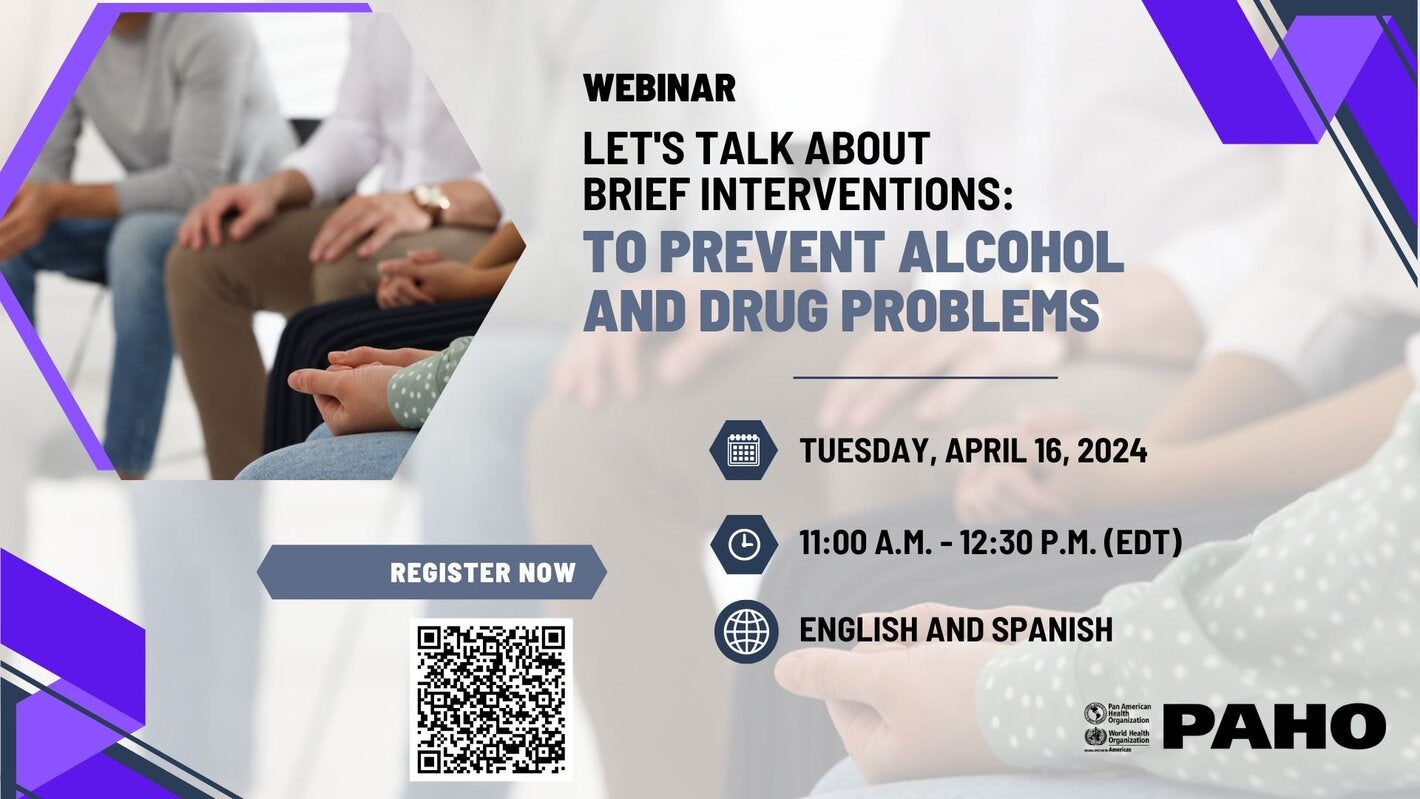
Join us on Tuesday, April 16, 2024 at 11:00 a.m. (Washington D.C. or EDT) at the webinar: Let's talk about brief interventions to prevent alcohol and drug problems. The purpose of this Webinar is to awaken and renew the interest of participants in the implementation of brief intervention models in alcohol and drugs, so that these interventions can become a tool for Primary Health Care and offer minimum conditions of counseling and support, for those who may be at risk or have problematic consumption of alcohol or drugs; additionally, it is intended to provide the minimum technical elements that facilitate the detection of those who may require a more complex intervention.
At the end of the Webinar, participants are expected to:
1. Identify the need to implement strategies in primary care for the early identification of people who may be at risk of alcohol or psychoactive substance use in general,
2. Know the definition of Brief Interventions, their scope, requirements, and situations in which their implementation may be useful,
3. Know about existing models of brief interventions and those more extensive interventions whose evidence has shown effectiveness,
4. To be able to promote, in each of their countries, broader discussions that lead to strengthening the capacity of care for people with alcohol and drug use problems.
Recording
How to participate
- DATE: Tuesday, April 16, 2024
- TIME: 11:00 A.M. (Washington D.C. time or EDT) [check the local time in other cities at the end of this page]
- LANGUAGES: English and Spanish with simultaneous translation.
- REGISTRATION: https://paho-org.zoom.us/webinar/register/WN_XjAf8o5fTxS-RR5pFhyCHQ#/registration
Note: The recording of the session will be available in this page after the webinar.
Context
Identifying at the Primary Health Care (PHC) level people at risk for alcohol and drug use problems, according to the detection of consumption patterns that may be problematic, is very useful to promote and carry out timely therapeutic interventions that improve the probability of their effectiveness.
Risk detection of consumption patterns is closely related to Brief Interventions (IBs), which consist of a primary and secondary prevention strategy for the risks and harms associated with the use of alcohol and other drugs (WHO, 2010). As a prevention strategy, Brief Interventions (IB) aim to identify current and potential problems associated with substance use and to motivate users who have risky use to change their behavior. As a rule, the IBs in PHC are a timely evaluation with a simple risk measurement instrument that classifies the pattern of substance use, then and according to this classification, an intervention is carried out whose duration, in general terms, is short and whose number of sessions, will depend on the brief intervention model adopted.
Agenda
Greetings and presentation of speakers
- Dr. Mario A Zapata, Regional Advisor, Alcohol and Drugs PAHO/WHO.
Installation
- Dr. Renato Oliveira, Head of Mental Health and Substance Use Unit, PAHO/WHO.
Presentation of Experiences:
Brief Interventions, Definition, and Potential Usefulness for Alcohol and Drug Use Problems
- Thomas F. Babor, PhD, MPH, Professor Emeritus, Dept. of Public Health Sciences. University of Connecticut School of Medicine, USA.
- Guillermina Natera, PhD, Emeritus Researcher of the National System of Researchers. Director of the Collaborating Center of the PAHO/WHO, Instituto Nacional de Psiquiatría-RFM, Mexico.
Motivational Interviewing
- Pablo Norabuena Cardenas, Advisor, Department of Mental Health, Ministry of Health, Chile. Adjunct Professor, School of Public Health, University of Chile.
- José Szapocznik, Ph.D. Chair Emeritus, Department of Public Health Sciences; co-director, Florida Node Alliance, National Drug Abuse Treatment Clinical Trials Network, University of Miami Miller School of Medicine.
Treatment FAMILY, its application in the Americas
- Anja Busse, Prevention, Treatment and Rehabilitation Section, Drug Prevention and Health Branch, UNODC - Vienna, Austria.
Closing and thanks
Time in other cities
- 8:00 a.m. – Los Angeles, Vancouver.
- 9:00 a.m. - Belmopan, Guatemala City, Managua, Mexico City, San Jose (CR), San Salvador, Tegucigalpa,
- 10:00 a.m. – Bogota, Kingston, Lima, Panama City, Quito
- 11:00 a.m. – Asunción, Bridgetown, Caracas, Georgetown, Havana, La Paz, Port of Spain, Port-au-Prince, Nassau, Ottawa, Santiago, San Juan, Santo Domingo, Washington D.C.
- 12: 00 a.m. - Buenos Aires, Brasilia, Montevideo, Paramaribo.
- 5:00 p.m. – Geneva, Madrid.
For other cities, check the local time using the following link.
